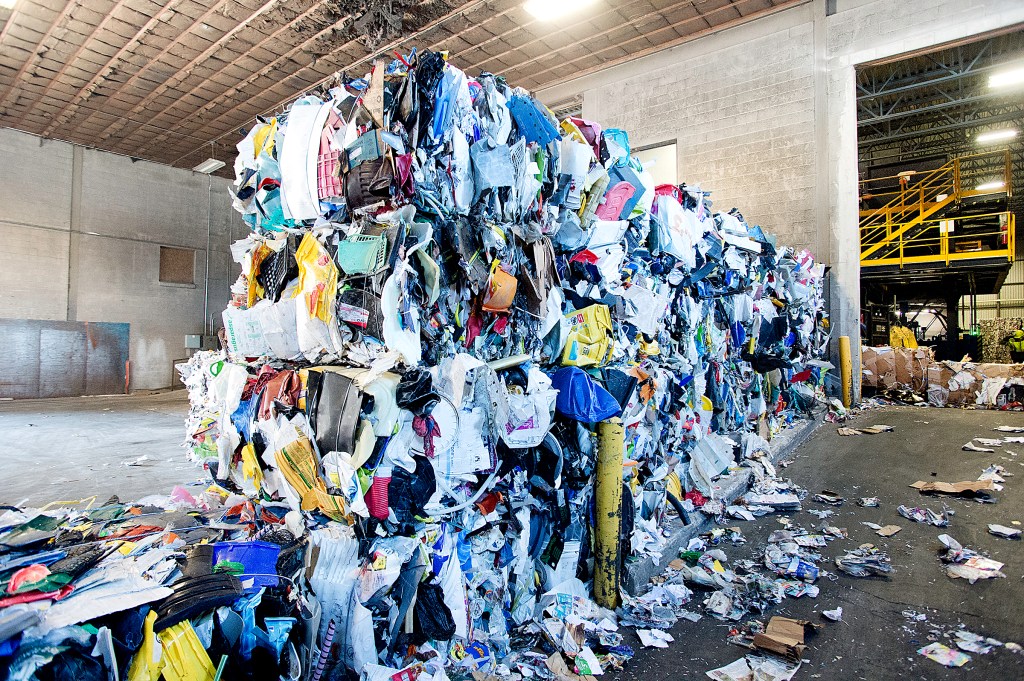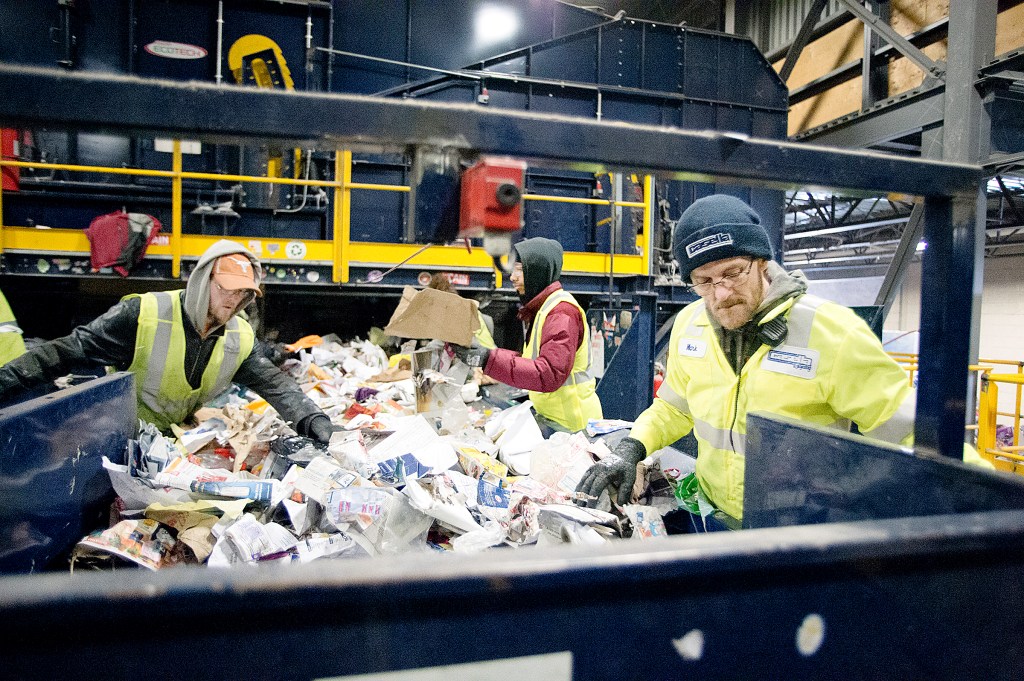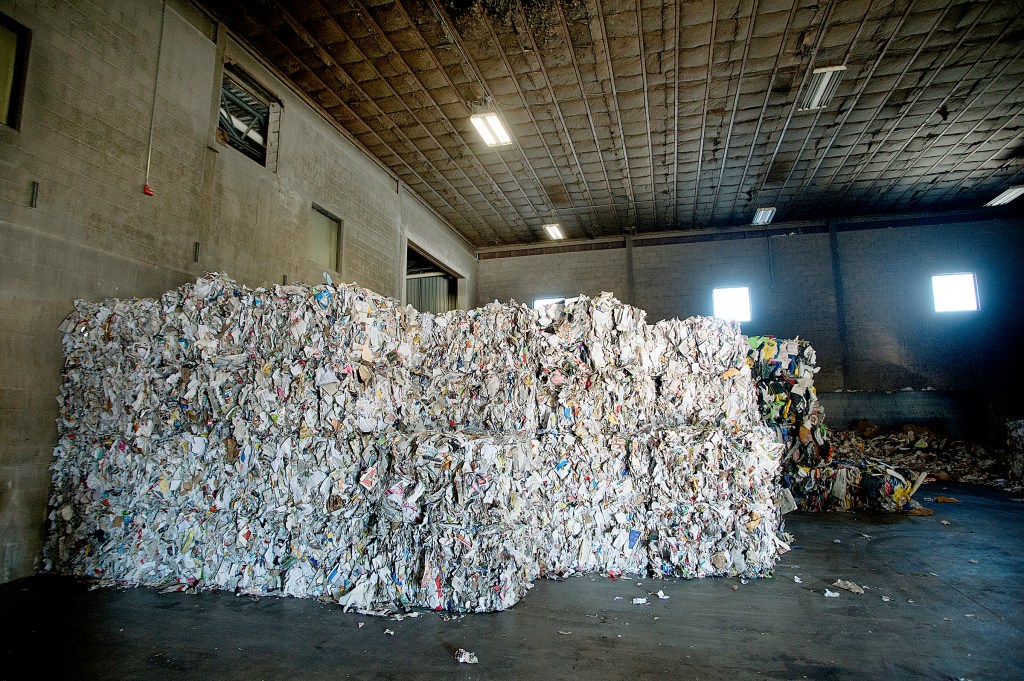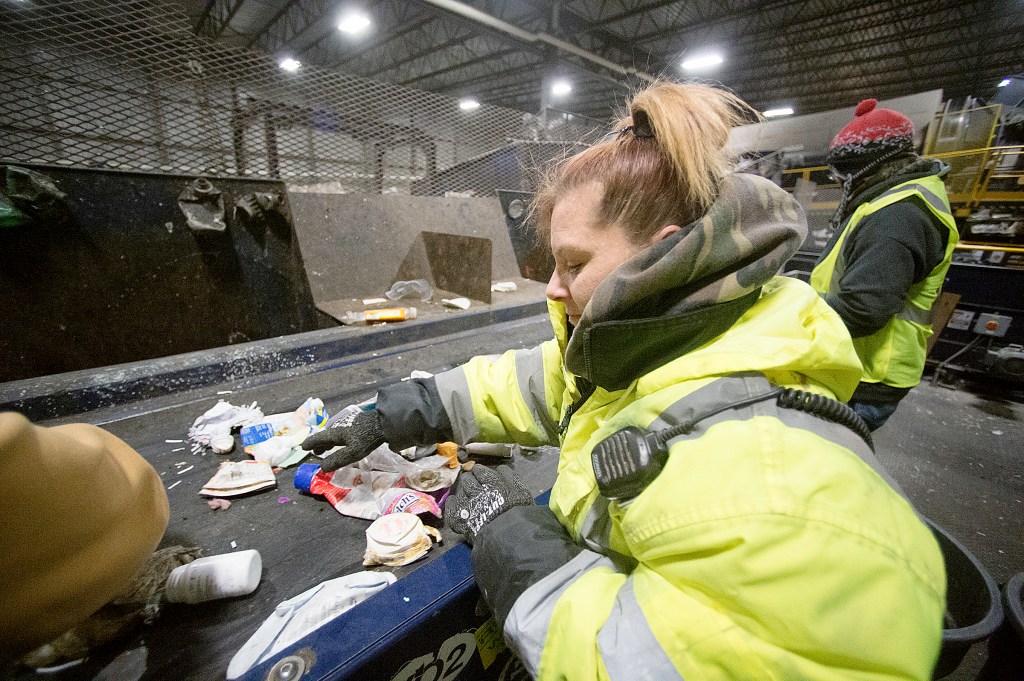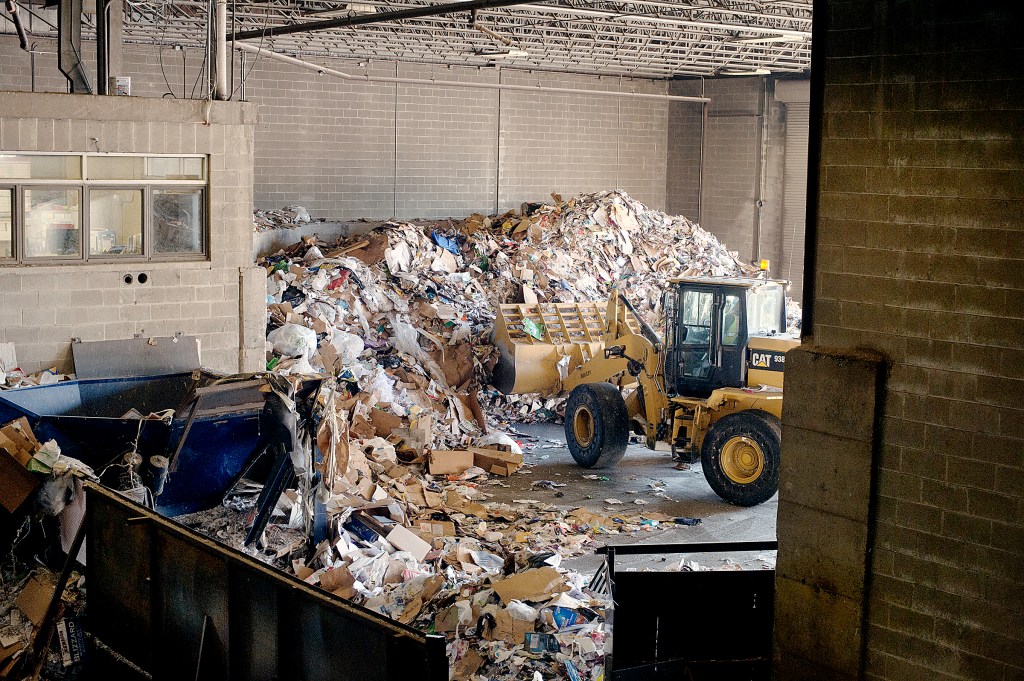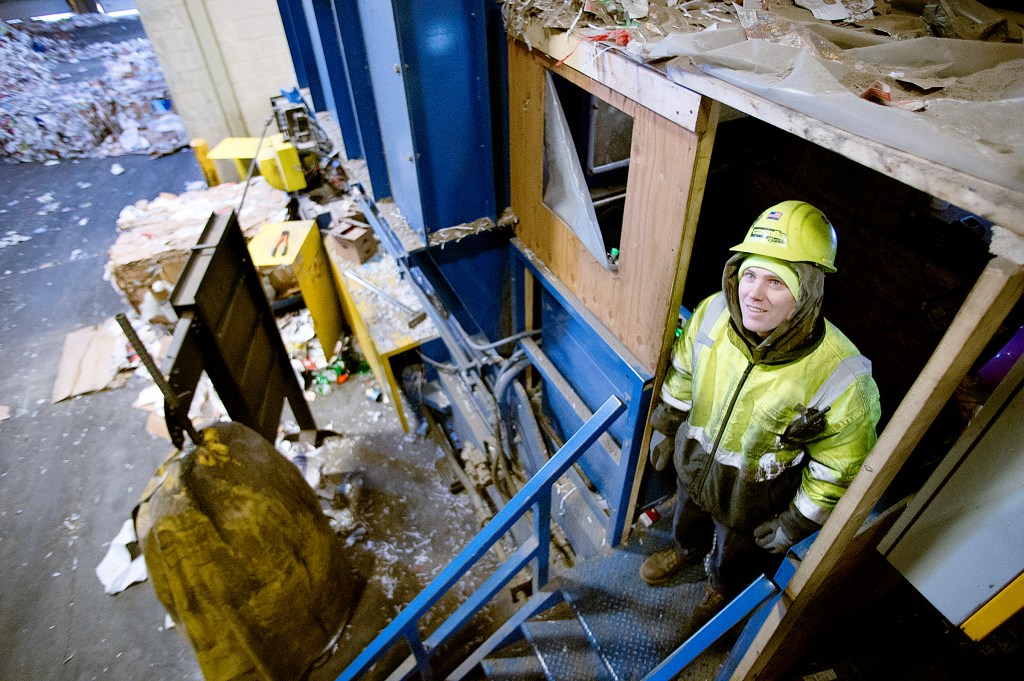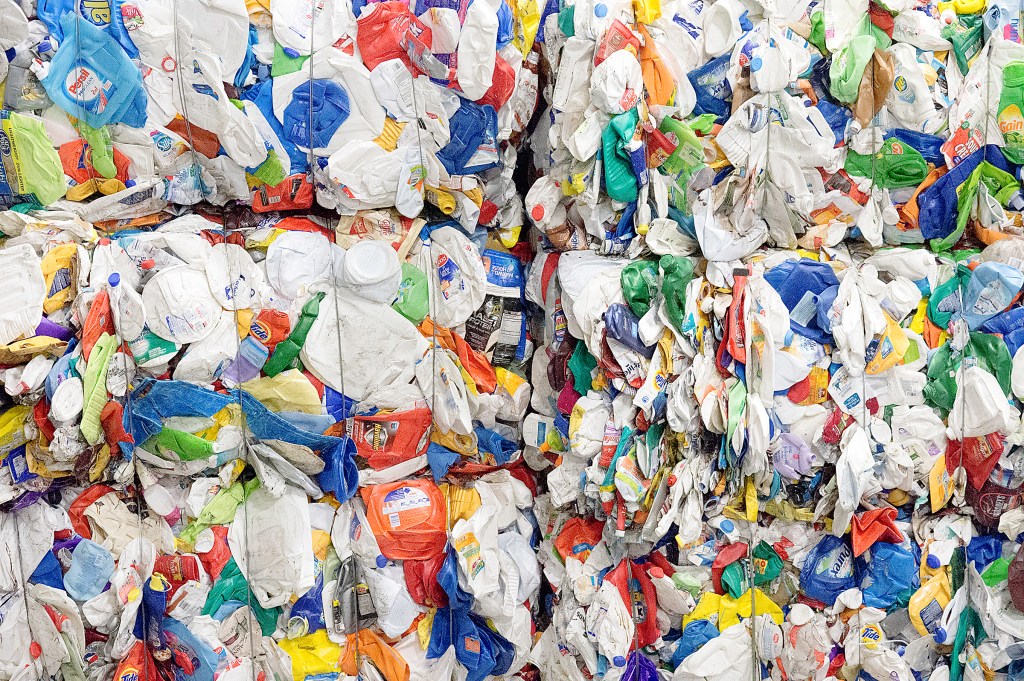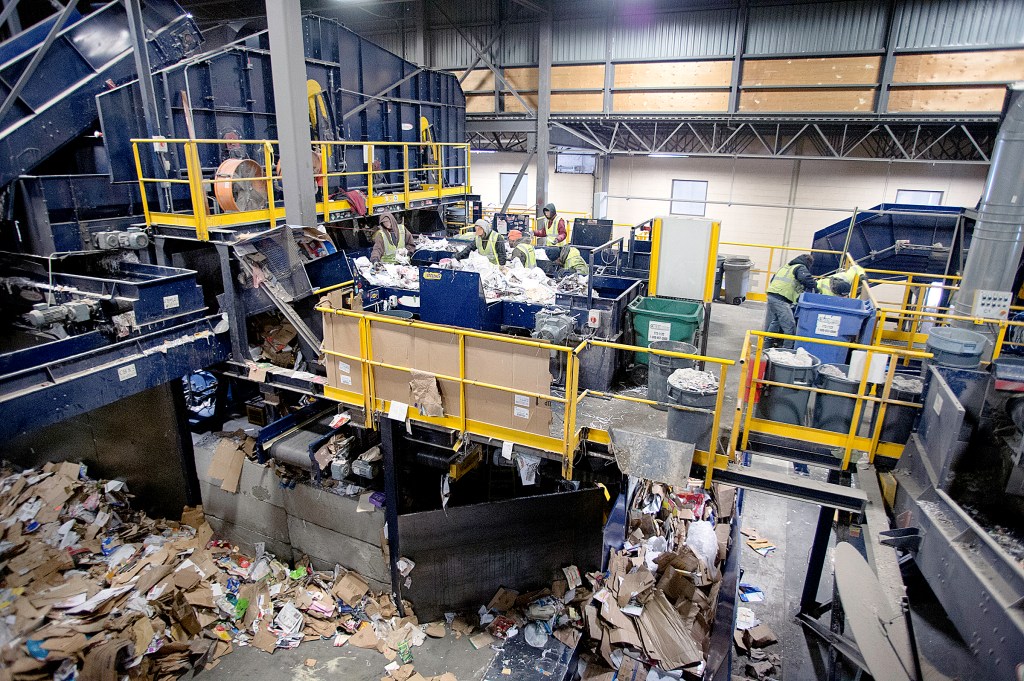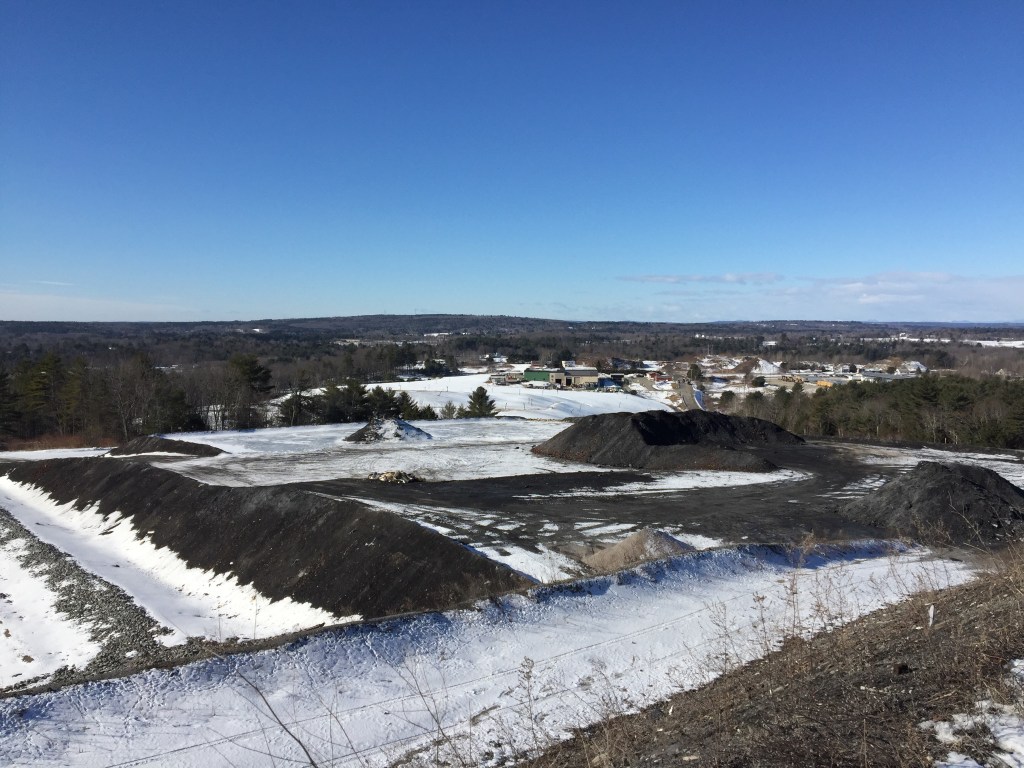LEWISTON — Dropping your trash and recyclables at the curb is just the beginning.
From there, waste streams follow long, complicated and expensive paths for municipalities. But, according to city officials, Lewiston’s current system is working — and well.
In Lewiston, trash from residents, schools and the solid waste facility goes to an incinerator in Auburn, and the resulting ash is deposited back at Lewiston’s secure landfill. All recycled material goes to Casella Solid Waste’s zero-sort facility, where, following a maze of belts and machinery, your pizza box could be on a cargo ship to China within a day.
“Instead of an expense, it’s a revenue stream,” said Rob Stalford, superintendent of the city’s solid waste division, about the current setup that has materials flowing in and out of the city.
The system now in use took a long and contentious road toward implementation, and city staff say there are still some public misconceptions about the process.
Last year, when Casella expanded its operation on River Road by bringing in material from outside the state, it reignited worries that Lewiston was becoming the “dumping ground” of the region. Casella currently trucks in materials from within the state and parts of New Hampshire.
A major portion of the city’s trash flow, however, is taking in waste from surrounding communities in the form of ash from the Mid-Maine Waste Action Corp. incinerator in Auburn.
The city maintains that the agreements with both Casella and MMWAC are vital to keeping costs — and waste levels — in the city as low as possible.
Stalford said the agreement reached with Casella was a “win-win” for the city. He said where most municipalities spend money to dispose of recycled material, Lewiston’s contract with Casella stipulates the opposite.
Casella leases the retrofitted and expanded River Road facility, while the city does not pay for its share of recycled material processed there. However, Lewiston is responsible for taking the ash from the leftover waste for disposal.
“There is a significant economic advantage to the city of Lewiston to recycle,” Stalford said.

Operations manager Scott Fortin uses a front loader to start the process of sorting material brought to the Casella zero-sort facility. Trucks from Maine and New Hampshire drop off material into this bay. From there, material will pass through 23 sorters at a rate of 20 tons per hour. Recycled materials will leave the facility in bales of plastic, paper, metal and glass. Daryn Slover/Sun Journal
Landfill life
The city’s partnership with MMWAC is a critically important step in the waste stream process, said David Jones, director of Lewiston Public Works.
Lewiston pays MMWAC $42.50 per ton to dispose of the solid waste, but takes in $40 from MMWAC for every ton of ash produced by the waste from surrounding areas. The incinerator is owned by 12 municipalities, including Auburn and New Gloucester, and also has a number of member communities.
In fiscal year 2015-16, the city disposed of 10,420 tons of municipal solid waste, costing $442,850 in tipping fees to MMWAC. In the same year, MMWAC generated 17,450 tons of ash from solid waste incineration, which was disposed in Lewiston’s landfill. Lewiston received $698,000 in revenue — a $255,150 difference to the good.
Stalford said the Lewiston landfill acts as a regional landfill due to the ash intake, but that 85 percent of the solid waste is incinerated in Auburn.
Lewiston’s 25-acre landfill was capped in 1995, and Jones said the current landfill — at 15.5 acres — was filling quickly until the agreement with MMWAC was reached last year.
“A landfill that should have been closed in 2000, actually today at current disposal rates has a life expectancy of another 30 years,” Stalford said.
Driving through the landfill recently, Jones and Stalford pointed out the mounds of ash, which resemble piles of black compost. With a closer look, banana peels and shards of metal were visible, and a large number of birds were scavenging the site.
Roughly 98 percent of what’s in the landfill is ash, Jones estimated. He said there’s also a small portion of industrial waste.
Prior to partnering with MMWAC, the city was pricing out the cost of expanding the landfill, which would’ve run the city $4 million.
“There are very real costs associated,” said Stalford, referring to the state-mandated process to prepare a landfill.
The landfill layout is separated by “cells,” which are sections of the site that have been adequately prepared.
City Administrator Ed Barrett said there are costs associated with the landfill, including managing and spreading ash, as well as cell closings and post-closure costs.
But, he said, with no MMWAC the city would have to haul waste “a considerable distance at a higher cost,” or reopen the landfill to solid waste.
“We don’t want to go there,” he said.
Jones drove to the top of a cell on a makeshift road. Eventually, he said, the entire site would reach the same height. Despite the nature of the location, the view from the top is one of the best in the city, he said.
“My vision is, 35 to 40 years from now, this could be a terrific recreation area,” he said, referring to when the landfill is eventually capped. He said plans are in the works for trails to be developed on some adjacent land.
Stalford said the department routinely hears concern from residents about landfill capacity, and from those who believe all of the city’s trash still goes directly to the landfill.
Jones said that if MMWAC didn’t exist, the city’s solid waste budget would rise by six or seven figures.
According to its website, MMWAC processes about 70,000 tons of trash per year, with a family of three generating about one ton of trash each year.
John King, executive director of MMWAC, said the arrangement in place with Lewiston “is very beneficial to both parties” and prolongs the life of the landfill.
King said there are 14 member municipalities on top of the 12 that own MMWAC, plus private haulers. All the ash produced there is brought to Lewiston. The agreement between the parties runs through June 30, 2022.
If the agreement with Lewiston didn’t exist, King said, MMWAC would have to look elsewhere, possibly to the Waste Management landfill in Norridgewock.

The view from the top of the Lewiston landfill off River Road shows piles of ash in the active landfill, with the closed landfill and the Casella recycling facility in the distance. Andrew Rice/Sun Journal)
Casella has room to expand
When the city was first negotiating its contract to bring Casella into the region in 2012, the company’s reputation, and finances, were called into question during public meetings.
At the time, Barrett said that leasing city-owned property to Casella would allow the city to more easily regulate the operation.
Based in Vermont, Casella also operates its own landfills, curbside collection services and produces organic material and energy from waste. The company’s stock price was at its lowest level in 2008, but reached near-record highs in 2016.
The facility opened in 2014, replacing Lewiston’s old recycling operation, and Jones says the partnership has been solid. Casella’s lease, signed in 2013, is good for 20 years.
While giving a recent tour of the facility, Rachel Washburn, general manager of Casella Recycling LLC, said the operation in Lewiston has “absolutely” gone smoothly.
In 2016, Casella processed about 30,400 tons of material at the Lewiston facility. Washburn said they employ 35 people, 10 through a temp agency.
Although the contract with Casella was amended in September 2016 to accommodate an expansion, with the addition of a second shift and roughly 30 more employees, Washburn said that hasn’t happened — yet.
The company has a much larger recycling facility in Charlestown, Massachusetts. Last year company officials said expanding the Lewiston facility would mean taking in materials from New Hampshire, Vermont and Quebec, Canada, but city councilors did not agree to allowing material to come to Lewiston from across the U.S. border.
Washburn said of the approximately 150 tons processed daily, about 45 tons comes from New Hampshire.
Washburn said the facility could add the second shift if it grows its customer base. Material comes in from about 80 municipalities, and Washburn says the company is always working to expand that number. For now, she said, the addition of material from New Hampshire has “maximized” one shift.
All material brought to the Casella recycling facility in Lewiston is processed and trucked out to Massachusetts within a day. The agreement with the city stipulates that any leftover waste from the material — normally about 8 percent — becomes part of Lewiston’s solid waste. Washburn said the average at recycling facilities is 15 percent.
“You’d be amazed at what people put in their recycling,” she said.
Washburn said Casella is looking to invest in more education programs over the next few years to hopefully cut down on the amount of non-recyclable material they receive.
At one point during the tour, a shoe popped up on a conveyor belt used to separate material. At another turn, there was a canvas bag full of old camping gear. She said VHS tapes are the biggest issue for their system; the tape wraps itself around belts, heats up and causes major delays.
“That’s something you want to send to the incinerator,” Jones said.
arice@sunjournal.com

Bales of recycled mixed paper wait to be picked up from the Casella zero-sort facility in Lewiston. The bales will be put into an overseas container and sent to Boston. From there, the bales will be shipped to China to be used to make paper. (Daryn Slover/Sun Journal)
Fast trash facts:
• In fiscal 2015-16, Lewiston disposed of 10,420 tons of municipal solid waste.
• During the same year, 17,450 tons of ash, from 26 municipalities, were dumped in the Lewiston landfill.
• Lewiston’s 15.5-acre landfill has a life expectancy of another 30 years. The adjacent 25-acre landfill was capped in 1995.
• Mid-Maine Waste Action Corp. in Auburn processes 70,000 tons of trash per year.
• Casella Recycling in Lewiston processed 30,400 tons of recycled material in 2016. About 150 tons are processed daily, with 45 tons coming from New Hampshire.
Copy the Story Link
Comments are not available on this story.
Send questions/comments to the editors.


